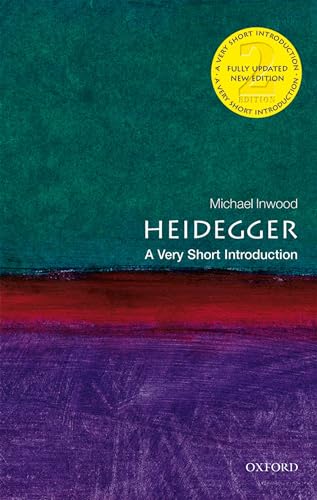Heidegger
A Very Short Introduction (Very Short Introductions)
Michael Inwood
BOOK REVIEW

In the dizzying labyrinth of modern philosophy, few names evoke as much intrigue and mystique as Martin Heidegger. His thoughts on existence, being, and the nature of reality ripple through the intellectual waves, prompting not just admiration but an intense mix of fascination and confusion. Michael Inwood's Heidegger: A Very Short Introduction is both a beacon and a compass for those eager to traverse this complex terrain, offering clarity without diluting the profound depth of Heidegger's inquiries.
This book is not merely an introduction; it's a key to unlocking one of the 20th century's most enigmatic figures. You'll find yourself drawn into the existential angst and revelations that Heidegger penned, accompanied by Inwood's deft guiding hand. Here, the reader isn't just skimming the surface; rather, you will plunge into the depths of key concepts such as "Dasein," a term Heidegger coined to describe the unique human experience of being. Inwood skillfully sketches the evolution of Heidegger's thoughts, painting a vivid backdrop against which this philosopher revealed the seismic shifts in understanding existence itself. 🌌
Heidegger's controversial notions about technology, language, and time resonate deeply in today's rapidly shifting world. Each page reveals a struggle with what it means to genuinely exist in a world overrun by mechanization and abstraction. In a dazzling, poetic manner, Inwood highlights how these themes remain alarmingly relevant in an era where we're confronted with the existential anxiety that technology can breed. As you read, you can almost feel the weight of Heidegger's warnings pressing down, urging you to reflect on how the very essence of your being might be slipping through your fingers amid the algorithms and distractions of modern life.
Critics of Heidegger often spotlight his complex prose and alleged ambiguity, arguing that his ideas are obscured beneath layers of philosophical jargon. Indeed, Heidegger's texts can initially appear daunting, bordering on indecipherable. However, Inwood's decisive yet respectful tone cuts through the fog, offering you both the substance and the style necessary to engage deeply with the text. Many readers find themselves wrestling with the nuances of Heidegger's thought, the seduction of its complexity thrusting them into fervent discussions about existence, reality, and the self. It's stimulating and, at times, infuriating-feelings that Heidegger himself would likely embrace as an integral part of the human experience.
A significant portion of Inwood's exploration delves into the criticisms of Heidegger's affiliations and the implications of his political choices during a tumultuous period in history. Engaging with these allegations invites a profound reflection on the intersection of philosophy and ethics-navigating the murky waters of a thinker whose ideas are both revolutionary and controversial. This scrutiny imbues the reading experience with an urgency that demands your attention, as you reconcile the brilliance of his thoughts against the backdrop of moral ambiguity.
As you reflect on Heidegger's impact, consider the individuals he's inspired-fellow philosophers, writers, and even artists who found resonance in his reflections on being. The ripples of Heidegger's thoughts extend far beyond academia, stirring movements in existentialism, hermeneutics, and even postmodernism. It is impossible to overlook his influence on titans like Sartre and Derrida, whose works echo with the existential inquiries launched by Heidegger. You are not merely reading a book; you are stepping into a lineage of profound thought.
Inwood's Heidegger: A Very Short Introduction stands as a testament to the enduring relevance of existential thought. By the conclusion, you will feel that familiar chill of realization that discussions about existence are not just academic-they are deeply personal and inevitably transformative. So, as you close this brief yet powerful engagement with Heidegger's philosophy, remember: the questions he raises reflect our everyday struggles with meaning and purpose, nudging you toward your own exploration of what it truly means to be. 📚✨️
📖 Heidegger: A Very Short Introduction (Very Short Introductions)
✍ by Michael Inwood
🧾 176 pages
2019
#heidegger #very #short #introduction #very #short #introductions #michael #inwood #MichaelInwood